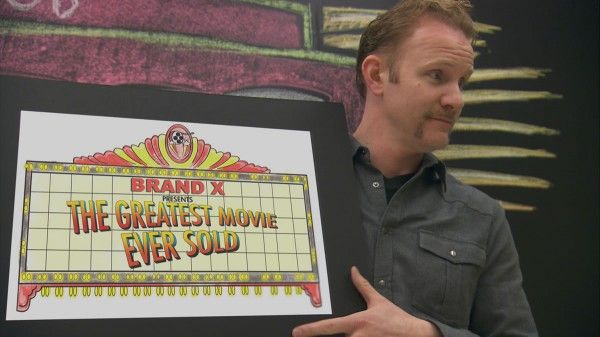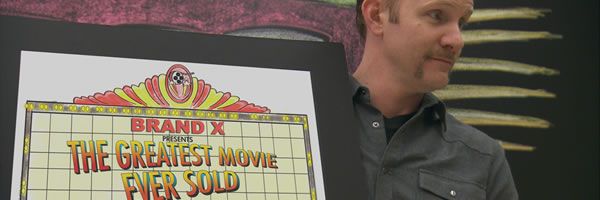Morgan Spurlock is a director who loves a good gimmick. Sometimes it works (Super Size Me) and sometimes it blows up in his face (Where in the World Is Osama Bin Laden?). The Greatest Movie Ever Sold offers his biggest stunt yet: Making a movie about the movie he’s making solely through corporate sponsorship as a way to explore the effect marketing and advertising has on our lives. The film is loads of fun as Spurlock meshes his fascinating hook with superb comic timing. While the film never quite gets to the heart of why companies spend so much on advertising and how effective that marketing is to their bottom line, it’s still an endlessly entertaining and effective reminder of how much advertising dominates our lives.The Greatest Movie Ever Sold is meta-movie. The film you’re watching is about Spurlock making the film you’re watching. Spurlock wants to make a documentary blockbuster (a “docbusterâ€) by selling out every aspect of his movie to corporations. The movie satirizes the idea of “brands†and how ridiculous and twisted it is to ask a person “What is their brand?â€Â That’s how backwards our world has become. Before we would question our identity, but now we look at ourselves as a product to be sold. Greatest Movie provides a keen behind-the-scenes look at how marketing machines function from their particular relationship to movie marketing (posters, trailers, collectors cups) to broader social issues of schools selling marketing in exchange for funding or how Sao Paolo, Brazil passed a law removing all billboards because they were seen as “visual pollution.â€For the most part, Spurlock does a fine job of balancing the silly with his serious point. Greatest Movie is his most satirical work to date and he has a wonderful knack for comedy. When he gets the movie sponsored by POM Wonderful (the official title of the film is POM Wonderful Presents The Greatest Movie Ever Sold, and in a savvy move by that company, I’m sure almost every review will mention them), he’s always finds the right time to take a swig of the beverage when he’s doing an interview. He knows just when to pull back and reveal an awkward product placement. Spurlock also has a great eye for the ridiculous, like when he’s going through a supermarket for possible sponsors and stumbles upon “Mane & Tailâ€, a shampoo for humans and horses. The documentary has a bit more trouble when it tries to explore the seriousness of marketing domination. There are times when the movie succeeds brilliantly, like when he shows us the creepiness of “neuro-marketing†or the outside-the-box thinking of Sao Paolo and their law to remove all outdoor advertising. However, when Spurlock goes to a school and shows how they’re attempting to sell ads, it feels a bit like his “Won’t somebody think of the children?†angle from Super Size Me. Most frustrating is he never adequately explains the effectiveness of marketing. For instance, while I understand ads for quick consumables like food, I’ve always been baffled by car commercials. A car is a big-ticket item that requires research, test-drives, and comparisons. An image of a Lexus driving through a desert doesn’t make me think “I gots to get me one of those for all my desert driving,†so why do companies spend the money on it? According to the film, $412 billion was spent last year on advertising, but how do companies know if they’re getting their money’s worth?The Greatest Movie Ever Sold is a clever flick when it comes to design and humor, but it has some trouble nailing down an insightful message about the nature of advertising. The companies he gets as sponsors will probably come off as cool and forward-thinking, but are you going to buy a Mini Cooper or stay at a Hyatt because they have a savvy marketing department? For all the brands in the film, the only one who really makes a sale is Spurlock.Rating: BFor all of our coverage of the 2011 Sundance Film Festival, click here. Also, here are links to all of my Sundance reviews so far:
The documentary has a bit more trouble when it tries to explore the seriousness of marketing domination. There are times when the movie succeeds brilliantly, like when he shows us the creepiness of “neuro-marketing†or the outside-the-box thinking of Sao Paolo and their law to remove all outdoor advertising. However, when Spurlock goes to a school and shows how they’re attempting to sell ads, it feels a bit like his “Won’t somebody think of the children?†angle from Super Size Me. Most frustrating is he never adequately explains the effectiveness of marketing. For instance, while I understand ads for quick consumables like food, I’ve always been baffled by car commercials. A car is a big-ticket item that requires research, test-drives, and comparisons. An image of a Lexus driving through a desert doesn’t make me think “I gots to get me one of those for all my desert driving,†so why do companies spend the money on it? According to the film, $412 billion was spent last year on advertising, but how do companies know if they’re getting their money’s worth?The Greatest Movie Ever Sold is a clever flick when it comes to design and humor, but it has some trouble nailing down an insightful message about the nature of advertising. The companies he gets as sponsors will probably come off as cool and forward-thinking, but are you going to buy a Mini Cooper or stay at a Hyatt because they have a savvy marketing department? For all the brands in the film, the only one who really makes a sale is Spurlock.Rating: BFor all of our coverage of the 2011 Sundance Film Festival, click here. Also, here are links to all of my Sundance reviews so far:
- Being Elmo: A Puppeteer’s Journey
- Benavides Born
- Bobby Fischer Against the World
- Corman’s World: Exploits of a Hollywood Rebel
- The Details
- Higher Ground
- Hobo with a Shotgun
- Homework
- How to Die in Oregon
- In a Better World
- The Interrupters
- The Lie
- Like Crazy
- Magic Trip
- Martha Marcy May Marlene
- The Music Never Stopped
- My Idiot Brother
- Page One: A Year Inside the New York Times
- Project Nim
- Reagan
- Red State
- Salvation Boulevard
- Submarine
- These Amazing Shadows
- Tyrannosaur
- Win Win

